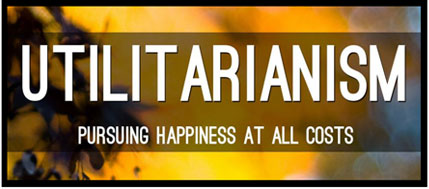Utilitarianism
Utilitarianism, typically popular in the US and other western capitalistic democracies, consists of two arguments: 1) connection to naturalistic principles of science and of social science and 2) social orientation. British utilitarians Jeremy Bentham, James Mill, and Henry Sidgwick used the pleasure principle as a foundational posit to justify utilitarianism - that happiness is pleasure and the absence of pain. Utilitarianism is inherently quantitative, so the social scientists measure what the general will actually is at any point in time. For social orientation the individual puts aside his own personal interests for something else not based upon his personal interest. A popular objection of utilitarianism is that emphasis upon the group can disadvantage minority individuals. The moral hazard of consequentialism is that there is the possibility that the best consequences are produced by ignoring justice and rights of individuals. As Bentham famously said, “rights are non-sense on stilts”. From a utilitarian point of view the scenario is acceptable as long as the suffering of the minority is outweighed by the majority’s happiness. Another objection against utilitarianism is the fact that you can’t accurately predict what will happen as a result of acting in a particular way (irony is the typical result). When the actual (bad) consequences differ from the expected (good) consequences, the typical excuse is ‘unintended consequences’ and the important political issue becomes ‘who’s responsible’? Another object is that it’s possible to be praised for doing wrong actions and for being blamed for doing right actions. From a utilitarian perspective a redistribution of goods in the manner of Robin Hood would cause an increase in overall happiness, or utility, in society. Of course, the persons being robbed would suffer some grief but if they were robbed of goods that they could spare, but the justification becomes “the utility value of these goods when given to the needy is enormous”. Taken to its extreme utilitarianism condones killing of innocent human beings, even murder, if it makes the world a better place. Another perspective in understanding Utilitariansm is that it supports the Golden Rule, but not the Silver Rule. Criticisms of Utilitarianism
z |
